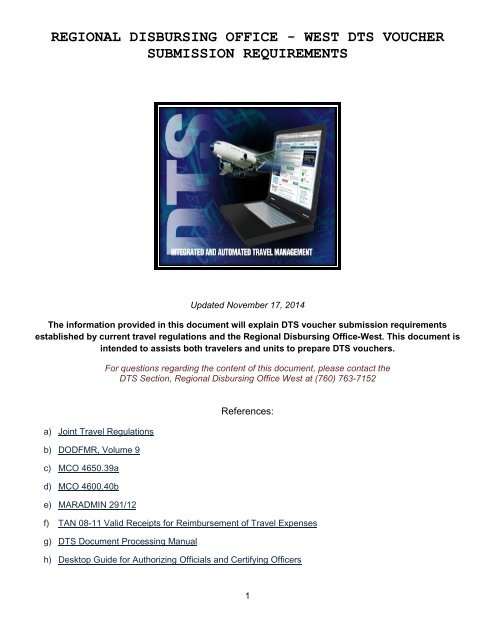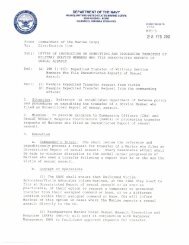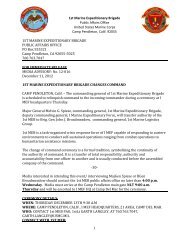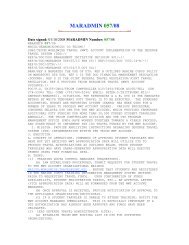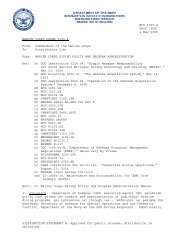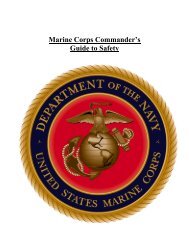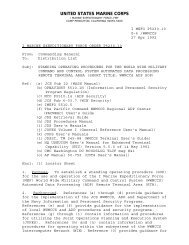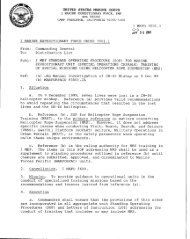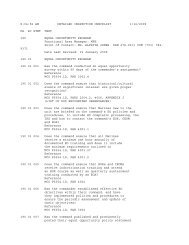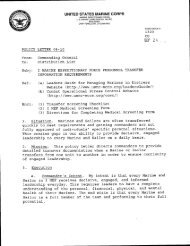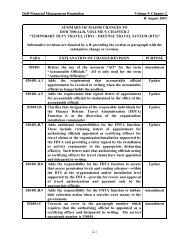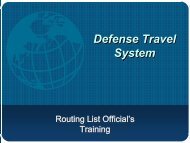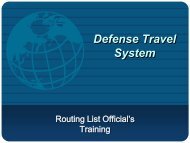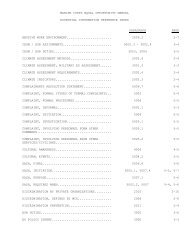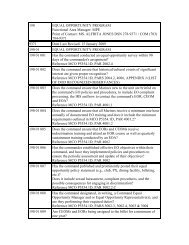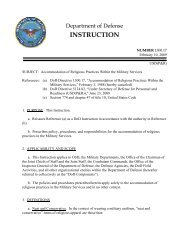DTS Voucher Submission Requirements
DTS Voucher Submission Requirements
DTS Voucher Submission Requirements
You also want an ePaper? Increase the reach of your titles
YUMPU automatically turns print PDFs into web optimized ePapers that Google loves.
REGIONAL DISBURSING OFFICE - WEST <strong>DTS</strong> VOUCHERSUBMISSION REQUIREMENTSUpdated November 17, 2014The information provided in this document will explain <strong>DTS</strong> voucher submission requirementsestablished by current travel regulations and the Regional Disbursing Office-West. This document isintended to assists both travelers and units to prepare <strong>DTS</strong> vouchers.For questions regarding the content of this document, please contact the<strong>DTS</strong> Section, Regional Disbursing Office West at (760) 763-7152References:a) Joint Travel Regulationsb) DODFMR, Volume 9c) MCO 4650.39ad) MCO 4600.40be) MARADMIN 291/12f) TAN 08-11 Valid Receipts for Reimbursement of Travel Expensesg) <strong>DTS</strong> Document Processing Manualh) Desktop Guide for Authorizing Officials and Certifying Officers1
<strong>Submission</strong> Timeline and Settlement <strong>Requirements</strong>TravelerCommands must ensure travelers are submitting their vouchers within five working days of completing theirtravel. Commands can restrict the number of days a traveler has to submit their voucher in an effort tominimize GTCC delinquencies.UnitsCommands must ensure that all vouchers are submitted to disbursing within two business days from the timea traveler digitally signs the voucher (or is T-entered) for approval.DisbursingDisbursing is required to approve all vouchers within three business days from the time the unit AO stamps thevoucher “Authorized”. Under no circumstance can a unit AO approve vouchers.Disbursing <strong>DTS</strong> Audit SectionThe Disbursing <strong>DTS</strong> Audit Section is available to provide <strong>DTS</strong> authorization and voucher preparationassistance to units who have a group travel, unit exercise, or unique TAD requirement involving multipletravelers. Unit Administrative Chiefs, ODTAs, or AOs can call the Help Desk and ask to speak with the <strong>DTS</strong>Audit Section Personnel.Unit AOs Must Review Every <strong>Voucher</strong>MARADMIN 291/12 requires that all vouchers (excluding TECOM) are reviewed by the unit before they aresubmitted to disbursing.This disbursing office requires that the last unit reviewer must be a unit Approving Official, level 25, andmust stamp the voucher with the “AUTHORIZED” stamp. MARFORRES unit AOs: must be level 26 and stampvouchers with the “CERTIFIED” stamp. This requirement is in place to ensure unit AOs are approving travelexpenses that were not previously approved on the authorization.Unit ODTAs are responsible to ensure the CPEN routing list is updated to reflect this process for each unit theysupport. CPEN Routing List Maintenance Instructions.Required Documentation and CommentsEvery voucher should “paint the picture” for disbursing AOs to know the purpose of the TAD and to ensure theTAD trip was in fact for official travel. The documentation mentioned in this section is required to ensure theright lodging and meal rate and reimbursable expenses are paid correctly.AuthorizationsThe unit AO must certify that the: TAD objective cannot be accomplished less expensively bycorrespondence, teleconferencing, web based communications, or other appropriate means. Thiscertification must be included in each authorization under Review/Sign/Other Auths/Add AdditionalAuthorizations For This Trip/Other.3
Trip Type, Purpose and DescriptionJTR, Appendix H, part 1 require that Authorizations and <strong>Voucher</strong>sidentify the correct Trip Type and Purpose.A detailed explanation of the TAD purpose is required in TripDescription block (i.e. UDP advance party, or Attending SACOcourse). Avoid using MOS specific acronyms.Reporting and detaching endorsements for training or unit exercisesFormal training: The schoolhouse commander will determine the appropriate meal rate (M&IE). This is madeon the schoolhouse’s reporting and detaching endorsement. The endorsement must be included in thevoucher.The endorsement must include the availability of government quarters and messing and identify any periods offield duty. The endorsement should be prepared by the TAD site admin personnel and can be preparedutilizing a NAVMC 11118 or unit letterhead endorsement.Unit exercises: (Includes any TAD define by the JTR, chapter 4, part f) Personnel TAD to a unit exerciseshould be placed on field duty. This includes TAD to ITX, WTI, RIMPAC, Cobra Gold, etc.<strong>Voucher</strong>s submitted to disbursing requesting the payment of per diem must include a field dutystatement/certification and the quarters and messing availability statement. The LOI can be submitted to certifythe payment of per diem only if it specifically identifies the quarters and messing availability.Field dutyThe certification is required for any TAD identified as unit exercises/JTFs, or TAD involving field duty.Disbursing requires the unit AO include a statement in the Comments to the Approving Official identifyingany periods of field duty or to certify that if field duty was performed (i.e. performed field duty Apr 4-9 andApr 12-18, or No field duty was performed).Field Duty is defined by the JTR as: a period in which an individual or unit is provided meals in a GOV’TDINING FACILITY/MESS or with an organization drawing field rations, and is provided GOV’T QTRS or isquartered in accommodations normally associated with field exercises. (Quoted from JTR, Appendix A1)ConferencesTravelers attending a conference must identify the type of conference in the Trip Overview (Section F),Preview Trip, or for local vouchers: in the Local <strong>Voucher</strong> Date Screen.Per TAN 13-14,the traveler must make a comment in Comments to the Approving Official stating if anymeals were provided at no cost as part of the conference (i.e. I was provided lunch on Jul 1 at no cost, orNo meals were provided).This is a requirement whether the traveler is claiming a registration/conference fee or not. If thetraveler does not make the certification, disbursing will return the voucher.4
Quarters and messing endorsementsWhen government messing or quarters are directed but are not available at the TAD site, the traveler mustprovide a certificate or a non-availability statement from the TAD site.If government quarters and messing is directed on the authorization, the government messing rate and thegovernment lodging rate for that installation will be paid if the traveler does not provide the proper justificationor a non-availability statement.Government quarters and messing cannot be directed when the TAD is not on a government installation.For formal schools: the schoolhouse commander makes all government quarters and messing determinations.This determination is provided in the reporting and detaching endorsement issued by the schoolhouse.TAD in the Local AreaPer diem is not authorized when TAD is performed in the local area of the traveler’s duty station or permanentworksite unless overnight lodging is required at the TAD site.If the unit AO determines that the TAD trip overnight lodging is required and that the traveler is entitled to perdiem, the unit AO must include the justification on the voucher.The I MEF <strong>DTS</strong> website contains the Camp Pendleton and MCAS Miramar local area designations.TAD LeaveUnits should have procedures in place to ensure that leave is being reported and approved before a travelerdeparts for TAD. There is no entitlement to per diem for when a traveler is on leave.Click here for more information on TAD leave and how it should be reflected on the voucher.<strong>Voucher</strong> Preparation and <strong>Submission</strong>Click here to obtain basic instructions on how to prepare a voucher.Click here to obtain detailed instructions on how to prepare a voucher.T-entered <strong>Voucher</strong>s/Local <strong>Voucher</strong>sPer MARADMIN 348/14, travelers should prepare and digitally sign their own <strong>DTS</strong> vouchers. <strong>Voucher</strong>s shouldonly be T-entered for travelers who are unable to prepare their own voucher because they do not havereasonable access to a cac-enabled computer. T-enter refers to vouchers that have been prepared bysomeone other than the traveler.<strong>Voucher</strong>s. <strong>Voucher</strong>s that have been T-entered require a signed DD 1351-2. The DD1351-2 must be signed bythe traveler and must be uploaded into the voucher as a substantiating record. Click here for an example of afilled out DD 1351-2.The signed DD1351-2 must reflect:‣ block 4: Full Social Security Number‣ block 18: All expenses being claimed (i.e. lodging, rental car, airfare, and all non-mileage expenses)‣ block 16: POC travel (owner/operator) has to be checked for the payment of POV mileage6
Local <strong>Voucher</strong>s. Local <strong>Voucher</strong>s that are T-entered must have a SF1164 form completed and signed by thetraveler. The signed SF1164 must be uploaded as a substantiating document. Click here for an example of afilled out SF form 1164.Local <strong>Voucher</strong>sClick here to obtain basic instructions on how to prepare a local voucher.Click here to obtain detailed instructions on how to prepare a local voucher.Local vouchers are used for reimbursement for expenditures on official travel in the local area of the traveler’sduty station or worksite. Items commonly reimbursed through a local voucher are, but not limited to, mileagefor local travel and missed meals.Local vouchers must clearly identify the purpose or justification for the expense under Comments tothe Approving Official. For example: “Traveler attending a required medical appointment.”By forwarding the local voucher to disbursing via the AUTHORIZED or CERTIFIED stamp, the unit AO iscertifying that the expenses being claimed are for official business and that the required comments areincluded.Local Mileage ReimbursementPOV mileage can be authorized for official travel between a traveler’s residence and an alternate work site ormilitary treatment facility within the local area. If this is the case, the traveler must deduct normal one waycommute under “Normal one-way mileage from Residence to PDS” for each portion of travel. This is requiredas the JTR only authorizes reimbursement for the distance that exceeds the normal commuting distance.AO’s should be familiar with the JTR, para 2805 which describes travel in local area of the duty station. Inaddition, para U2805.E has several examples of how a traveler’s normal commute must be deducted.Travel to Required Medical Appointments Over 100 Miles. Uniformed personnel traveling by POV to arequired medical appointment are authorized the reduced mileage (Other Mileage Rate). (Reference JTR, para7095). Review the JTR, chap 2600 for the current rate. In <strong>DTS</strong>, the traveler must select the: POC Use-GovVehicle Avail rate.Unofficial Travel. A member who voluntarily travels to the medical facility to obtain a medical diagnosis ortreatment (i.e. sick call or appointments) is not on official travel and therefore POV mileage is not authorized.(JTR, para 2800.f)Missed MealsJTR, Chapter 4, Part F addresses reimbursement for missed meals. If authorized by the AO, reimbursement isfor actual expenses only and the daily amount claimed cannot exceed the Proportional Meal Rate for the area.7
Government Travel Credit Card (GTCC)Mandatory UsePer MCO 4600.40b, travelers that have been issued a GTCC are mandated to use the GTCC to pay fortransportations charges (most commonly airfare), lodging, and rental vehicles. Travelers should use to GTCCto the maximum extent possible for travel related expenses to minimize cash withdrawals.Split DisbursementPer MARADMIN 291/12, disbursing is mandated to ensure that the GTCC balance is paid off upon settling<strong>DTS</strong> vouchers. Disbursing will verify the GTCC balance through the Citibank website and ensure that travelershave split disbursed enough money to pay off the balance. If the traveler did not allocate enough funds to paythe card balance, disbursing will make the adjustment pay off the card. Disbursing will not reduce the amountof split disbursement even if the amount exceeds the GTCC balance.Back-to-Back TAD TripsWhen a traveler is traveling on back-to-back TAD trips in which the GTCC balance reflects charges from otherTAD trips, the traveler must make annotations on the voucher that is being routed for approval underComments to the Approving Official stating how much to send to the GTCC. Example: I am (or, traveler is)on a concurrent TAD trip and elect to have $__.__ sent to the GTCC. Failure to provide comments willprompt disbursing to pay off the current GTCC balance. Disbursing will still validate that the traveler will haveenough entitlements on the current and future voucher to pay off the GTCC balance before allowing anyamount less than the balance to be split disbursed on the current voucher.GTCC Expedited FeesMARADMIN 691/13 eliminates travel advances for TAD and mandates that travelers apply for the GTCC uponnotification of an upcoming TAD trip effective February 1, 2014. Unit AOs are prohibited from schedulingadvance payments in <strong>DTS</strong> unless authorized by MARADMIN 691/13.If the traveler is applying for the GTCC and the card delivery must be expedited, the AO can authorize theGTCC expedited fee of $20. This expense must be justified by the unit AO.Required ReceiptsAll receipts must conform to the requirements of TAN 8-11. Receipts must contain the name of the companyproviding the services, date(s) of purchase or date(s) services were rendered, and the unit price. In addition,the receipt must indicate that the balance had been paid.Click here for detailed listing of required receipts.The following receipts are required for:1. Airfare2. Lodging3. Rental vehicle4. Expenses of $75.00 or more8
Statements-in-LieuTravelers can submit statements-in-lieu of receipts when the original receipt is impracticable to obtain or it hasbeen inadvertently lost/destroyed. The traveler must state why the original receipt cannot be provided andstatement must be completely filled out. Disbursing ROs and AOs will scrutinize these statements and willcontact the establishments to validate the expenses being claimed.Airfare ReceiptsClick here for an example of an airfare receipt.Airfare receipts are required when paid with the GTCC or when authorized to be purchased with a personalcredit card. The receipt must show the amount of the airfare and the last four numbers of the credit card usedto pay the airfare.Airfare receipts, booked through SATO (Camp Pendleton, MCAS Miramar, MCAGCC Twenty-nine Palms), canbe found on www.virtuallythere.comAirfare receipts, booked through RAVENEL Travel (MCAS YUMA, MCB Barstow, Reserve units) can be foundon https://mytripandmore.com/. Airfare receipts are available up to 7 days after the return flight.Note: Travelers commonly mistake the flight itineraries as the airfare receipts. Remember: the airfare receiptmust reflect the cost of the flight and credit card info.Rental Vehicles ReceiptsClick here for examples and explanations of a rental car receipts and fees.The rental car receipt must be the receipt that the rental car facility issued the traveler upon returning the rentalcar. The rental car receipt must be itemized and show all the fees charged by the rental car facility.Note: Travelers commonly mistake the rental car agreement that is issued to the traveler upon picking up therental car as the receipt. The receipt will always show the miles “in” and “out”.Rental vehicle insuranceTAD in the continental U.S or in a non-foreign OCONUS location – GARS insurance is the only insurancethat the traveler should elect and is the only insurance that will be reimbursed by disbursing.TAD outside the continental U.S. - Rental car insurance is reimbursable.Rental Car UpgradesA compact size rental vehicle is the standard size rental car for official travel. The unit AO may approve anappropriately sized rental vehicle that will meet mission requirements when a compact size does not. Unit AOsmust justify the upgrade in the Comments to the Approving Official block but preferably in the Pre-Auditpage of either the authorization or voucher.Acceptable comments are: Full size rental vehicle authorized, traveler transporting other travelers. or, The useof an SUV is required, traveler transporting government property.9
Lodging ReceiptsClick here for an example of a lodging receipt.Lodging receipts must show the daily lodging itemized rate. Express checkout bills are not valid receipts.Note: Express checkout bills are statements provided to travelers the night before checking out and reflect theitemized amount the traveler will be charged. These statements reflect that the balance “will be settled to”.These are not valid receipts.Lodging Reservations Made OnlineLodging reimbursement is authorized for hotel lodging obtained through an online booking agent only when theonline agent can provide the traveler with an itemized receipt reflecting: daily hotel room cost, daily taxes, andmiscellaneous fees. Travelers should be warned that most online booking agents do not provide itemizedreceipts. Per the JTR, a statement-in-lieu cannot be accepted when an online booking agent cannotprovide an itemized lodging receipt.Meal RatesFull RateAlso known as the Commercial Meal Rate (CMR). CMR is payable when a traveler is authorized the fulllocality meal rate for the TAD area. The full per diem rate is payable when government messing is not availableor directed, or when deductible meals are not provided.Note: If a traveler is TAD to a U.S. installation, government messing should be directed and utilized to themaximum extent possible.Available RateAlso known as the Government Meal Rate (GMR). GMR is the rate payable when government messing isdirected and available on the U.S installation where the traveler is TAD and the traveler incurs lodging on base.GMR must be directed on the authorization. The current GMR rate is $16.85 (Meals and incidental expense).Proportional Meal RateProportional Meal Rate (PMR) is payable if the traveler is provided one or two meals at no expense orgovernment messing is available for one or two meals on any day. Government lodging must be available andutilized for the PMR to be payable. See Conferences when meals are provided at no cost to the traveler.In <strong>DTS</strong>, under Per Diem Entitlements, the traveler must select the Provided rate and select which mealswere provided or in which government messing was available.If all three meals are provided at no cost to the traveler on any day then only the Incidental Expense (IE) ispayable.Incidental Expense (IE)1. The standard IE for the continental U.S. (CONUS) is $5. In <strong>DTS</strong>, the IE is part of the GMR, PMR, CMR.2. The standard onbase IE outside CONUS (OCONUS) rate is $3.50.3. Review JTR, chapter 4340, for exemptions.10
Flat-rate per diemEffective for travel beginning or orders amended on or after 1 November 2014. A reduced flat-rate per diemapplies when a traveler is assigned long-term TAD (more than 30 days at one location). (Reference: JTR,chapter 4, part B, section 4.)<strong>DTS</strong> authorizations must include the flat-rate per diem payable. This will ensure that travelers understandexactly what they will be paid.1. On the travel day to the TDY location, the traveler receives up to 100% lodging per diem at the locality rateand 75% meals and incidental expenses (M&IE).2. For TAD that will last 31 -180 days (in a single location), the authorized flat rate is 75% of the locality rate(lodging plus M&IE) payable for each full day of TAD at that location.3. For TAD that will last 181 days or greater (in a single location), the authorized flat rate is 55% of the localityrate (lodging plus meals and incidental expenses (M&IE)) payable for each full day of TDY at that location.Normally, TDY over 180 days is prohibited, but may be authorized by HQMC (MMIA).4. Travelers must incur a lodging cost in order to be reimbursed flat rate per diem.5. Travelers are not required to submit a lodging receipt but may be required to validate to their ApprovingOfficial that they did incur lodging costs.6. Authorizations for travel beginning Nov 1, 2014 for more than 30 days must reflect the flat-rate per diem.7. If travelers are unable to find suitable commercial lodging at or under the reduced per diem rate, theyshould contact their Commercial Travel Office (CTO) for assistance. Disbursing will require a statementfrom CTO/unit AO to certify that lodging was not available at the flat-rate (lodging) rate. The AO may thenauthorize reimbursement for the actual lodging cost (not to exceed the locality per diem rate). The mealrate will still be paid at the flat-rate.8. Lodging taxes [CONUS and non-foreign OCONUS (see appendix A for definition)] are separatereimbursable expenses (non-mileage expense). Lodging taxes must be prorated if the lodging cost aloneexceeds the amount of flat-rate per diem for lodging.Additional information can be obtained from:MARADMIN 533/14Flat-Rate Per Diem FAQsGuidance for Completing Flat-Rate Per Diem in <strong>DTS</strong>Exemptions:1. The flat rate per diem does not apply when government lodging or contracted government lodging isavailable AND directed, when contracted government lodging is provided at no cost, or if a travelerchooses to stay in government quarters.2. The Government Meal Rate (GMR) and Proportional Meal Rate (PMR) are still payable based on theavailability of government messing. The GMR and PMR are not prorated to either 75% or 55%.11
Special Rate Option for Meals in <strong>DTS</strong>The special rate option for meals is to be used to pay the flat-rate per diem. In addition, the special rate can beused to pay WESTPAC UDP per diem for Sailors or other service personnel. Do not use the special rate optionto for CMR, PMR, GMR.LodgingLodging cost should normally be under the established maximum lodging rate.Lodging that exceeds the established maximum will only be paid by disbursing if actual expense allowance(AEA) for lodging is authorized and justified by the unit AO.For TAD in the continental U.S., travelers must claim the lodging tax separately as a non-mileage expense.1. When lodging exceeds the maximum lodging rate and AEA is not authorized, the lodging expense will belimited to the maximum lodging rate. AO must also ensure the all reimbursable taxes and prorated.2. Personal choice to use other quarters: If government quarters weren’t used due to personal preferencethe traveler must be reimbursed the rate of government quarters.3. Online booking: Lodging booked online can only be reimbursed if the booking agent provides anditemized lodging receipt. A statement-in-lieu cannot be used to claim lodging if the online agent cannotprovide an itemized receipt.4. Shared room: If two travelers on funded TAD orders shared a room, they must both pay half the lodgingcost and should claim their share on the voucher. If a traveler shares the room with a person not on orders(spouse) then the traveler must claim the single room rate and fill out a shared room statement.Miscellaneous Expenses (Non Mileage Expenses)Appendix G of the JTR, addresses the more commonly incurred reimbursable expenses. Every expense islisted and identified as reimbursable to uniformed members by an X under UNIF MBR. Additionally, theexpense is reimbursable for civilians/DOD employees by an X under CIV EMP. Travelers should communicatewith the unit RO or AO before claiming an expense that is not listed in Appendix G of the JTR.Effective 1 October 2014: ATM fees, certain baggage tips, laundry/dry cleaning and transportation tipsare no longer reimbursable. They are part of the Incidental Expense portion of the M&IE. The JTR,appendix G has been updated to reflect this change.Note: Travelers must ensure that the amounts claimed on the voucher are in fact for expenses incurred andthat they match the receipts submitted; not doing so will normally result in the voucher being returned forclarification.This office recommends that unit’s business practices require that travelers upload receipts for all expensesclaimed under non-mileage expenses.Airport terminal parking. Reimbursement is limited to two one-way cab fares. Cab fare estimates can beobtained from any rental car company’s website that provides the cab fare estimate tools.GTCC Expedited Fee. The $20 expedite fee can only be claimed if the card was expedited due to a shortnotice TAD requirement. The unit AO must authorize the expense.12
CTO fees. CTO fees are automatically posted in <strong>DTS</strong> when flights are booked in <strong>DTS</strong>. Additional fees areincurred if flights are changed. Traveler should review their GTCC to verify if additional fees have beencharged by the CTO. Additional fees can be claimed as a non-mileage expense.Rental car. If the rental car was properly reserved in <strong>DTS</strong>, the traveler must ensure that the amount paid isupdated in the Travel/Rental Car <strong>DTS</strong> screen. A separate non-mileage expense should not be created toclaim the rental car expense.Registration fees. Only registration fees associated with conference attendance can be reimburse on a <strong>DTS</strong>voucher.The Following Expenses Require Justification:Excess BaggageBirth CertificateDaytime Lodging FeesLodging While on LeaveComputer ConnectionsNonrefundable Room DepositsDriver Services EarlyGreen Card Passport, Visa, FeesLicense/ Permit, International DriverDual LodgingLegal Service FeesRegistration/Conference feesOperating Cost for Government VehiclesGTCC Expedited FeesCheckout FeesInterpreter ServicesGTCC Late FeesMission-Related ExpensesPer JTR, Appendix G, mission-related expenses are not authorized to be reimbursed on a <strong>DTS</strong> voucher.Examples of mission-related expenses include (but not limited to) school/course tuition, communicationservices (cell phone), witness fees, printing costs, supplies (batteries, tools, parts), mail (FedEx) expenses.Travelers incurring mission related expenses must contact the unit AO who in turn will contact the comptroller’soffice and determine if the expense is reimbursable. If payable, the comptroller’s office will process a WideArea Workflow (WAWF) System miscellaneous payment.Group TravelGroup travel is defined in the JTR as travel away from the duty station during which the mission requirestravelers to remain together as a group while actually traveling. Normally per diem is payable for travel daysunless the authorization directs limited or no reimbursement. This comment can be added to theauthorization under Review-Sign/Other Auths./Other(see remarks below). If limited or no reimbursementis cited on the authorization, this means that food and/or lodging was provided at no cost to all travelers fortravel days. Further explanation can be found in the JTR, para 4090.g.13
Mileage ReimbursementMileage To and From the TAD site. The unit AO must make the determination to approve the travel asadvantageous to the government (beneficial to the government) or not-advantageous to the government(beneficial to the traveler). The unit AO must make the determination and state this in the Comments to theApproving Official section of the voucher so that disbursing AOs know whether to pay full POV mileage orlimit the reimbursement to the amount reflected in the CTW. The traveler must allow <strong>DTS</strong> to compute themileage amount by reflecting mileage from the Residence or Duty Station to the TAD site under the nonmileagetab. Unit ROs and AOs should become familiar with Chapter 4, part G of the JTR for the regulationson POV mileage reimbursement options for travel to the TAD site.In and Around the TAD Site. If the unit AO authorizes in and around mileage at the TAD site, it shouldnormally be authorized/approved for travel between the lodging and duty site, duty sites, and lodging or dutysite and dining facilities. Mileage reimbursement is only authorized for travel on official business. A traveler canfill out an in-and-around mileage statement and claim the total in the non-mileage section of the voucher.Constructed Travel Worksheet (CTW)Click here for instructions CTW worksheetsTravel to the TAD site should be performed by the most expeditious and cost-effective transportation mode.POV use is advantageous to the government for distances of 400 miles or less (800 miles round trip). No CTWis needed to be uploaded to the <strong>DTS</strong> authorization/voucher.A CTW is required if a traveler is authorized to travel via privately to TAD locations which are commonlytraveled to/from by commercial air.A CTW is also required when a traveler is authorized to purchase his/her own transportation due to going onleave before or after a TAD trip if the traveler will deviate from the travel .Traveler’s requirements.The traveler must complete the CTW. The traveler must also attach supporting documentation to theauthorization that shows the cost of the transportation, such as the <strong>DTS</strong> Travel module cost display or costprovided by the CTO. For airfare, this would be the GSA Contract Fare.Unit AO’s requirements when authoring POC travel.The unit AO must make the determination to approve the travel as advantageous to the government(beneficial to the government) or not-advantageous to the government (beneficial to the traveler).The unit AO must make the determination and state this in the Comments to the Approving Official sectionof the voucher so that disbursing AOs knows whether to reimburse the traveler the full mileage rate or limit thereimbursement to the government airfare cost.If no determination is stated on the voucher, disbursing will limit the reimbursement to the government cost.The JTR, Chapter 4775 and Sections 9.3 of the detailed instructions explain the determining factorsthat the unit AO should consider when determining whether to authorize full or limited mileagereimbursement.14
Currency ConversionA traveler is required to provide the exchange rate for any expense paid in foreign currency.When the expense is paid with the GTCC or credit card, the applicable exchange rate is based on the date thecard company posts the expense and not the date the expense is paid by the traveler. It is recommended thattravelers review their credit card statement to determine the applicable exchange rate.Disbursing will utilize the exchange rate reflected on the GTCC if it is visible via the <strong>DTS</strong> link on the voucher.Travelers can submit their credit card statement that reflects the amount charged along with the receipt.Currency conversion rates can be obtained via the OANDA website at http://www.oanda.com/.WESTPAC Unit Deployment Program (UDP)Advance Party: Both Marines and Sailors participating in the advance party of a UDP (usually travel toOkinawa for 30 days) are required to file a <strong>DTS</strong> voucher. The proper entitlement to GMR, PMR, or CMR basedon the availability of government quarters and messing must be stated on the authorization. The voucher mustidentify that the traveler was part of a UDP advance party.It is highly recommended that the unit prepare a roster that identifies all advance party participants and statesthe availability of government quarters and messing. This will ensure that the correct per diem rate is paid toeach traveler.UPDs Underway: The Standard Flat Rate per diem currently payable under MARADMIN 208/10 is reportedin MCTFS 3270 and is not payable to Marines via <strong>DTS</strong>. Because Navy’s pay systems does not have thecapability to pay Sailors the Standard Flat Rate per diem while on a UDP, Sailors can submit a <strong>DTS</strong> voucher toget paid for the Standard Flat Rate per diem while participating in a UDP. A unit endorsement identifying thedates of the UDP, in which the per diem is payable, must be uploaded to the voucher.Contingency Per Diem for Civilians and Service Members other than MarinesThe current per diem payable for service members participating in contingency operations is $3.50 and startsthe day after arrival and stops the day before departure.The voucher must contain a unit endorsement that identifies the traveler as a participating member, traveldates, and the dates the traveler participated in the operation.Tad In Excess Of 180 Consecutive DaysRequest for approval of TAD in excess of 180 days must be submitted to HQMC (MMIA) through their OMB:smb_manpower_mmia@usmc.mil. See MMIA’s website and paragraph 3 of MARADMIN 601/05 for additionalinformation. Disbursing will limit reimbursement to 180 days for vouchers that don’t have the required approvalfor TAD in excess of 180 days.No traveler should be issued an authorization in excess of 180 days unless HQMC(MMIA)’s approval isreceived and attached as a substantiating document. Review MARADMIN 601/05 for exceptions.15
<strong>DTS</strong> DebtsThe responsibility to pay back a <strong>DTS</strong> debt owed back to the government lies mainly with the traveler. The unitand Debt Management Monitor (DMM) will assist and ensure that <strong>DTS</strong> debts are repaid as soon a possible.After a voucher with an amount due to the government is approved, <strong>DTS</strong> will send the traveler an email<strong>DTS</strong> Notification of Debt.The traveler has 30 days to make a payment via the pay.gov website, mail a check, or request a payrollcollection.A reminder will be sent at the 27 day mark if the debt has not been repaid.Marines: A payroll collection will be reported in 3270 for the lump sum of the debt on the 32nd day. AMarine can contact the DMM to determine if the debt can be paid back in installments.For other service personnel and civilians: The DMM will forward a request for a lump sum payrollcollection on the 30 day mark if the traveler has not paid the debt off. The traveler can contact the DMMto see if the debt can be paid back in installments.Once a debt has been acknowledged as paid off, <strong>DTS</strong> will send the traveler an email Notification of aDue U.S. Satisfactory Repayment of Debt.Contact the DMM for more information on the debt collection process.16


